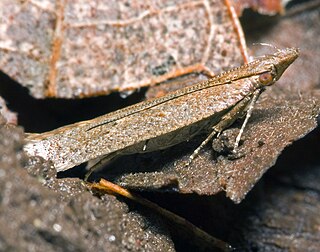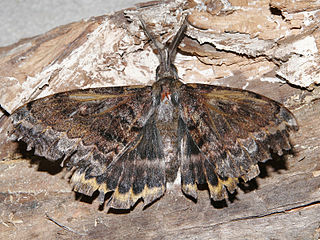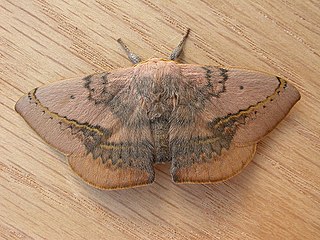
The Noctuidae, commonly known as owlet moths, cutworms or armyworms, are a family of moths. Taxonomically, they are considered the most controversial family in the superfamily Noctuoidea because many of the clades are constantly changing, along with the other families of the Noctuoidea. It was considered the largest family in Lepidoptera for a long time, but after regrouping Lymantriinae, Catocalinae and Calpinae within the family Erebidae, the latter holds this title now. Currently, Noctuidae is the second largest family in Noctuoidea, with about 1,089 genera and 11,772 species. This classification is still contingent, as more changes continue to appear between Noctuidae and Erebidae.

The Gelechiidae are a family of moths commonly referred to as twirler moths or gelechiid moths. They are the namesake family of the huge and little-studied superfamily Gelechioidea, and the family's taxonomy has been subject to considerable dispute. These are generally very small moths with narrow, fringed wings. The larvae of most species feed internally on various parts of their host plants, sometimes causing galls. Douglas-fir (Pseudotsuga) is a host plant common to many species of the family, particularly of the genus Chionodes, which as a result is more diverse in North America than usual for Gelechioidea.

Grass skippers or banded skippers are butterflies of the subfamily Hesperiinae, part of the skipper family, Hesperiidae. The subfamily was established by Pierre André Latreille in 1809.

Anthelidae is a family of Australian lappet moths in the order Lepidoptera. It had earlier been considered to be part of the Lasiocampoidea superfamily, but a 2008 molecular phylogenetic study, supported by a 2011 study, resulted in reincluding the Anthelidae in the superfamily Bombycoidea.

Eupterotidae is a family of insects in the order Lepidoptera with more than 300 described species.

Earias is a genus of moths in the monotypic subfamily Eariadinae of the family Nolidae. The genus was erected by Jacob Hübner in 1825. Species are found throughout Europe, Africa, Asia and Australia, some being agricultural pests such as bollworms.
Phenacomorpha is a monotypic moth genus in the subfamily Arctiinae described by Turner in 1940. Its single species, Phenacomorpha bisecta, was first described by Thomas Pennington Lucas in 1891. It is found in Australia.

Anthela varia, the variable anthelid, is a moth of the family Anthelidae. The species was first described by Francis Walker in 1855. It is found in the coastal areas of southern Western Australia, southern Queensland, New South Wales, and Victoria.

Anthela nicothoe, the urticating anthelid, is a moth of the family Anthelidae.

Heliothinae is a small, cosmopolitan subfamily of moths in the family Noctuidae, with about 400 described species worldwide. It includes a number of economically significant agricultural pest species, such as Helicoverpa armigera and Helicoverpa zea.

Persoonia linearis, commonly known as the narrow-leaved geebung, is a shrub native to New South Wales and Victoria in eastern Australia. It reaches 3 m (9.8 ft), or occasionally 5 m (16 ft), in height and has thick, dark grey papery bark. The leaves are, as the species name suggests, more or less linear in shape, and are up to 9 cm (3.5 in) long, and 0.1 to 0.7 cm wide. The small yellow flowers appear in summer, autumn and early winter, followed by small green fleshy fruit known as drupes. Within the genus Persoonia, it is a member of the Lanceolata group of 58 closely related species. P. linearis interbreeds with several other species where they grow together.

Persoonia chamaepeuce, commonly known as the dwarf geebung or heathy geebung, is a plant in the family Proteaceae and is endemic to south-eastern Australia. It is a prostrate shrub with crowded, linear leaves and yellow flowers in the leaf axils.

Anthela is a genus of moths of the family Anthelidae. The genus was erected by Francis Walker in 1855.
Anthela canescens is a moth of the family Anthelidae. It is found in Australia.
Anthela ekeikei is a moth of the family Anthelidae. It is found in New Guinea.
Anthela rubriscripta is a moth of the family Anthelidae first described by Thomas Pennington Lucas in 1891. It is found in Australia.
Anthela trisecta is a moth of the family Anthelidae first described by Thomas Pennington Lucas in 1898. It is found in Australia.

Isopogon linearis is a small shrub in the family Proteaceae that is endemic to the southwest of Western Australia.












